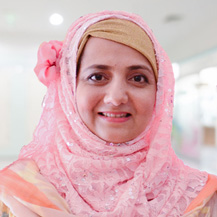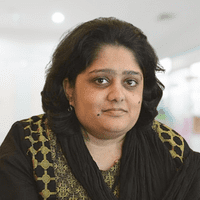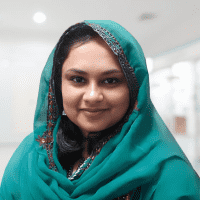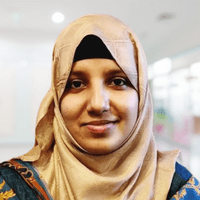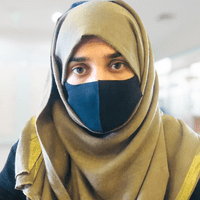Autism Spectrum Disorder (ASD)
Autism spectrum disorder is a condition related to brain development that impacts how a person perceives and socialises with others, causing problems in social interaction and communication. The disorder also includes limited and repetitive patterns of behaviour. The term “spectrum” in autism spectrum disorder refers to the wide range of symptoms and severity.
Autism spectrum disorder includes conditions that were previously considered separate — autism, Asperger’s syndrome, childhood disintegrative disorder and an unspecified form of pervasive developmental disorder. Some people still use the term “Asperger’s syndrome,” which is generally thought to be at the mild end of autism spectrum disorder.
Autism spectrum disorder begins in early childhood and eventually causes problems functioning in society — socially, in school and at work, for example. Often, children show symptoms of autism within the first year. A small number of children appear to develop normally in the first year and then go through a period of regression between 18 and 24 months of age when they develop autism symptoms.
While there is no cure for autism spectrum disorder, intensive, early treatment can make a big difference in the lives of many children.

Symptoms of Autism Spectrum Disorder
Some children show signs of autism spectrum disorder in early infancy, such as reduced eye contact, lack of response to their name or indifference to caregivers. Other children may develop normally for the first few months or years of life but then suddenly become withdrawn or aggressive or lose language skills they’ve already acquired. Signs usually are seen by age 2 years.
Each child with autism spectrum disorder is likely to have a unique pattern of behaviour and level of severity — from low functioning to high functioning.
Some children with autism spectrum disorder have difficulty learning, and some have signs of lower-than-normal intelligence. Other children with the disorder have normal to high intelligence — they learn quickly yet have trouble communicating and applying what they know in everyday life and adjusting to social situations.
Because of each child’s unique mixture of symptoms, severity can sometimes be challenging to determine. It’s generally based on the level of impairments and how they impact the ability to function.
Social Communication and Interaction
A child or adult with autism spectrum disorder may have problems with social interaction and communication skills, including any of these signs:
- Fails to respond to his or her name or appears not to hear you at times
- Resists cuddling and holding and seems to prefer playing alone, retreating into his or her world
- Has poor eye contact and lacks facial expression
- Doesn’t speak, has delayed speech, or loses previous ability to say words or sentences
- Can’t start a conversation or keep one going, or only starts one to make requests or label items
- Speaks with an abnormal tone or rhythm and may use a singsong voice or robot-like speech
- Repeats words or phrases verbatim but doesn’t understand how to use them
- Doesn’t appear to understand simple questions or directions
- Doesn’t express emotions or feelings and appears unaware of others’ feelings
- Doesn’t point at or bring objects to share interest
- Inappropriately approaches a social interaction by being passive, aggressive or disruptive
- Has difficulty recognising nonverbal cues, such as interpreting other people’s facial expressions, body postures or tone of voice
Patterns of Behaviour
A child or adult with autism spectrum disorder may have limited, repetitive patterns of behaviour, interests or activities, including any of these signs:
- Performs repetitive movements, such as rocking, spinning or hand flapping
- Performs activities that could cause self-harm, such as biting or head-banging
- Develops specific routines or rituals and becomes disturbed at the slightest change
- Has problems with coordination or has odd movement patterns, such as clumsiness or walking on toes, and has odd, stiff or exaggerated body language
- Is fascinated by details of an object, such as the spinning wheels of a toy car, but doesn’t understand the overall purpose or function of the object
- Is unusually sensitive to light, sound or touch, yet may be indifferent to pain or temperature
- Doesn’t engage in imitative or make-believe play
- Fixates on an object or activity with abnormal intensity or focus
- Has specific food preferences, such as eating only a few foods or refusing foods with a particular texture
When To See A Doctor?
Babies develop at their own pace; many don’t follow the exact timelines in some parenting books. However, children with autism spectrum disorder usually show some signs of delayed development before age 2 years.
If you’re concerned about your child’s development or you suspect that your child may have autism spectrum disorder, discuss your concerns with your doctor. The symptoms associated with the disorder can also be linked with other developmental disorders.
Signs of autism spectrum disorder often appear early in development when there are noticeable delays in language skills and social interactions. Your doctor may recommend developmental tests to identify if your child has delays in cognitive, language and social skills if your child:
- Doesn’t respond with a smile or happy expression by 6 months
- Doesn’t mimic sounds or facial expressions by 9 months
- Doesn’t babble or coo by 12 months
- Doesn’t gesture — such as point or wave — by 14 months
- Doesn’t say a single word by 16 months
- Doesn’t play “make-believe” or pretend by 18 months
- Doesn’t say two-word phrases for 24 months
- Loses language skills or social skills at any age
Causes of Autism Spectrum Disorder
Autism spectrum disorder has no single known cause. Given the complexity of the disorder and the fact that symptoms and severity vary, there are probably many causes. Both genetics and environment may play a role.
Genetics
Several different genes appear to be involved in autism spectrum disorder. For some children, autism spectrum disorder can be associated with a genetic disorder, such as Rett syndrome or fragile X syndrome. For other children, genetic changes (mutations) may increase the risk of autism spectrum disorder. Still, other genes may affect brain development or how brain cells communicate, or they may determine the severity of symptoms. Some genetic mutations are inherited, while others occur spontaneously.
Environmental Factors
Researchers are currently exploring whether factors such as viral infections, medications or complications during pregnancy, or air pollutants play a role in triggering autism spectrum disorder.
There is no link between vaccines and autism spectrum disorder.
One of the most significant controversies in autism spectrum disorder centres on whether a link exists between the disorder and childhood vaccines. Despite extensive research, no reliable study has shown a link between autism spectrum disorder and any vaccines. The original study that ignited the debate years ago has been retracted due to poor design and questionable research methods.
Risk Factors of Autism Spectrum Disorder
The number of children diagnosed with autism spectrum disorder is rising. It’s unclear whether this is due to better detection and reporting or an actual increase in cases or both.
Autism spectrum disorder affects children of all races and nationalities, but certain factors increase a child’s risk. These may include:
- Your child’s sex. Boys are about four times more likely to develop autism spectrum disorder than girls are.
- Family history. Families who have one child with autism spectrum disorder have an increased risk of having another child with the disorder. It’s also not uncommon for parents or relatives of a child with an autism spectrum disorder to have minor problems with social or communication skills themselves or to engage in certain behaviours typical of the disorder.
- Other disorders. Children with certain medical conditions have a higher than usual risk of autism spectrum disorder or autism-like symptoms. Examples include fragile X syndrome, an inherited disorder that causes intellectual problems; tuberous sclerosis, a condition in which benign tumours develop in the brain; and Rett syndrome, a genetic condition occurring almost exclusively in girls, which causes slowing of head growth, intellectual disability and loss of purposeful hand use.
- Extremely preterm babies. Babies born before 26 weeks of gestation may have a greater risk of autism spectrum disorder.
- Parents’ ages. There may be a connection between children born to older parents and autism spectrum disorder, but more research is necessary to establish this link.
Complications of Autism Spectrum Disorder
Problems with social interactions, communication and behaviour can lead to:
- Difficulties in school and with successful learning
- Employment problems
- Inability to live independently
- Social isolation
- Stress within the family
- Victimisation and being bullied
Prevention of Autism Spectrum Disorder
There’s no way to prevent autism spectrum disorder, but there are treatment options. Early diagnosis and intervention can improve behaviour, skills and language development. However, intervention is helpful at any age. Though children usually don’t outgrow autism spectrum disorder symptoms, they may learn to function well.
Diagnosis of Autism Spectrum Disorder
Your child’s doctor will look for signs of developmental delays at regular checkups. Suppose your child shows any symptoms of autism spectrum disorder. In that case, you’ll likely be referred to a specialist who treats children with autism spectrum disorder, such as a child psychiatrist or psychologist, pediatric neurologist, or developmental paediatrician, for an evaluation.
Because autism spectrum disorder varies widely in symptoms and severity, making a diagnosis may be difficult. There isn’t a specific medical test to determine the disorder. Instead, a specialist may:
- Observe your child and ask how your child’s social interactions, communication skills and behaviour have developed and changed over time
- Give your child tests covering the hearing, speech, language, developmental level, and social and behavioural issues
- Present structured social and communication interactions to your child and score the performance
- Include other specialists in determining a diagnosis
- Recommend genetic testing to identify whether your child has a genetic disorder such as Rett syndrome or Fragile X syndrome
Treatment of Autism Spectrum Disorder
No cure exists for autism spectrum disorder, and there is no one-size-fits-all treatment. The goal of treatment is to maximise your child’s ability to function by reducing autism spectrum disorder symptoms and supporting development and learning. Early intervention during the preschool years can help your child learn critical social, communication, functional and behavioural skills.
The range of home-based and school-based treatments and interventions for autism spectrum disorder can be overwhelming, and your child’s needs may change over time. Your healthcare provider can recommend options and help identify resources in your area.
If your child is diagnosed with autism spectrum disorder, talk to experts about creating a treatment strategy and build a team of professionals to meet your child’s needs.
Treatment options may include:
Behavior and Communication Therapies
Many programs address the range of social, language and behavioural difficulties associated with an autism spectrum disorder. Some programs focus on reducing problem behaviours and teaching new skills. Other programs focus on teaching children how to act in social situations or communicate better with others. Applied behaviour analysis (ABA) can help children learn new skills and generalise these skills to multiple situations through a reward-based motivation system.
Educational Therapies
Children with autism spectrum disorder often respond well to highly structured educational programs. Successful programs typically include a team of specialists and various activities to improve social skills, communication and behaviour. Preschool children who receive intensive, individualised behavioural interventions often show good progress.
Family Therapies
Parents and other family members can learn how to play and interact with their children in ways that promote social interaction skills, manage problem behaviours, and teach daily living skills and communication.
Other Therapies
Depending on your child’s needs, speech therapy to improve communication skills, occupational therapy to teach activities of daily living, and physical therapy to improve movement and balance may be beneficial. A psychologist can recommend ways to address problem behaviour.
Medications
No medication can improve the core signs of autism spectrum disorder, but specific medications can help control symptoms. For example, certain medications may be prescribed if your child is hyperactive; antipsychotic drugs are sometimes used to treat severe behavioural problems, and antidepressants may be prescribed for anxiety. Keep all healthcare providers updated on your child’s medications or supplements. Some medicines and supplements can interact, causing dangerous side effects.
Managing Other Medical And Mental Health Conditions
In addition to autism spectrum disorder, children, teens and adults can also experience:
- Medical health issues. Children with autism spectrum disorder may also have medical issues, such as epilepsy, sleep disorders, limited food preferences or stomach problems. Ask your child’s doctor how to manage these conditions best together.
- Problems with transition to adulthood. Teens and young adults with autism spectrum disorder may have difficulty understanding body changes. Also, social situations become increasingly complex in adolescence, and there may be less tolerance for individual differences. Behavior problems may be challenging during the teen years.
- Other mental health disorders. Teens and adults with autism spectrum disorder often experience other mental health disorders, such as anxiety and depression. Your doctor, mental health professional, and community advocacy and service organisations can offer help.
Planning for The Future
Children with autism spectrum disorder typically continue to learn and compensate for problems throughout life, but most will continue to require some level of support. Planning for your child’s future opportunities, such as employment, college, living situation, independence, and the services needed for support, can make this process smoother.
Alternative Medicine
Because autism spectrum disorder can’t be cured, many parents seek alternative or complementary therapies, but these treatments have little or no research to show that they’re effective. You could unintentionally reinforce negative behaviours. And some alternative treatments are potentially dangerous.
Talk with your child’s doctor about the scientific evidence of any therapy you’re considering.
Examples of complementary and alternative therapies that may offer some benefit when used in combination with evidence-based treatments include:
- Creative therapies. Some parents supplement educational and medical intervention with art or music therapy, focusing on reducing a child’s sensitivity to touch or sound. These therapies may offer some benefit when used along with other treatments.
- Sensory-based therapies. These therapies are based on the unproven theory that people with autism spectrum disorder have a sensory processing disorder that causes problems tolerating or processing sensory information, such as touch, balance and hearing. Therapists use brushes, squeeze toys, trampolines and other materials to stimulate these senses. Research has not shown these therapies to be effective, but they may offer some benefit when used along with other treatments.
- Massage. While massage may be relaxing, there isn’t enough evidence to determine if it improves symptoms of autism spectrum disorder
- Pet or horse therapy. Pets can provide companionship and recreation, but more research is needed to determine whether interaction with animals improves symptoms of autism spectrum disorder.
Some complementary and alternative therapies may not be harmful, but there’s no evidence that they’re helpful. Some may also include significant financial costs and be difficult to implement. Examples of these therapies include:
- Special diets. There’s no evidence that special diets are an effective treatment for autism spectrum disorder. And for growing children, restrictive diets can lead to nutritional deficiencies. If you pursue a restrictive diet, work with a registered dietitian to create an appropriate meal plan for your child.
- Vitamin supplements and probiotics. Although not harmful when used in normal amounts, there is no evidence they are beneficial for autism spectrum disorder symptoms, and supplements can be expensive. Talk to your doctor about vitamins, supplements, and the appropriate dosage for your child.
- Acupuncture. This therapy has been used to improve autism spectrum disorder symptoms, but the effectiveness of acupuncture is not supported by research.
Some complementary and alternative treatments do not have evidence that they are beneficial or potentially dangerous. Examples of complementary and alternative therapies that are not recommended for autism spectrum disorder include:
- Chelation therapy. This treatment is said to remove mercury and other heavy metals from the body, but there’s no known link with autism spectrum disorder. Chelation therapy for autism spectrum disorder is not supported by research evidence and can be very dangerous. In some cases, children treated with chelation therapy have died.
- Hyperbaric oxygen treatments. Hyperbaric oxygen is a treatment that involves breathing oxygen inside a pressurised chamber.
- Intravenous immunoglobulin (IVIG) infusions. There is no evidence using IVIG infusions improves autism spectrum disorder.
Sehatyab is an incredible online platform for autism care, offering access to trained professionals who specialise in counselling. It provides a safe way to address unique challenges, from behavioural therapy to social skills training, all from the comfort of home—a significant advantage for individuals with sensory sensitivities.
With personalised support plans and resources for the patients, Sehatyab helps them improve their quality of life.
Coping and Support
Raising a child with autism spectrum disorder can be physically exhausting and emotionally draining. These suggestions may help:
- Find a team of trusted professionals. A team, coordinated by your doctor, may include social workers, teachers, therapists, and a case manager or service coordinator. These professionals can help identify and evaluate the resources in your area and explain financial services and state and federal programs for children and adults with disabilities.
- Keep records of visits with service providers. Your child may have visits, evaluations and meetings with many people involved in his or her care. Keep an organised file of these meetings and reports to help you decide on treatment options and monitor progress.
- Learn about the disorder. There are many myths and misconceptions about autism spectrum disorder. Learning the truth can help you better understand your child and his or her communication attempts.
- Take time for yourself and other family members. Caring for a child with autism spectrum disorder can put stress on your relationships and your family. To avoid burnout, take time out to relax, exercise or enjoy your favourite activities. Schedule one-on-one time with your other children and plan date nights with your spouse or partner — even if it’s just watching a movie together after the children go to bed.
- Seek out other families of children with autism spectrum disorder. Other families struggling with the challenges of autism spectrum disorder may have helpful advice. Some communities have support groups for parents and siblings of children with the disorder.
- Ask your doctor about new technologies and therapies. Researchers continue to explore new approaches to help children with autism spectrum disorder. See the Centers for Disease Control and Prevention website on autism spectrum disorders for helpful materials and links to resources.
Preparing for Your Appointment
Your child’s healthcare provider will look for developmental problems at regular checkups. Mention any concerns you have during your appointment. If your child shows any signs of autism spectrum disorder, you’ll likely be referred to a specialist who treats children with the disorder for an evaluation.
Bring a family member or friend to the appointment to help you remember information and for emotional support.
What You Can Do?
Before your child’s appointment, make a list of:
- Any medications, including vitamins, herbs and over-the-counter medicines your child is taking and their dosages.
- Any concerns you have about your child’s development and behaviour.
- When your child begins talking and reaching developmental milestones, if your child has siblings, also share information about when they reached their milestones.
- Describe how your child plays and interacts with other children, siblings and parents.
- Questions to ask your child’s doctor to make the most of your time.
In addition, it may be helpful to bring:
- Notes of any observations from other adults and caregivers, such as babysitters, relatives and teachers. If other health care professionals or an early intervention or school program has evaluated your child, bring this assessment.
- A record of developmental milestones for your child, such as a baby book or baby calendar, if you have one.
- A video of your child’s unusual behaviours or movements if you have one.
Questions to ask your child’s doctor may include:
- Why do you think my child does (or doesn’t) have autism spectrum disorder?
- Is there a way to confirm the diagnosis?
- If my child does have autism spectrum disorder, is there a way to tell how severe it is?
- What changes can I expect to see in my child over time?
- What kind of special therapies or care do children with autism spectrum disorder need?
- How much and what kind of regular medical care will my child need?
- What kind of support is available to families of children with autism spectrum disorder?
- How can I learn more about autism spectrum disorder?
Don’t hesitate to ask other questions during your appointment.
What to expect from your child’s doctor
Your child’s doctor is likely to ask you several questions. Be ready to answer them to reserve time to review any points you want to focus on. Your doctor may ask:
- What specific behaviours prompted your visit today?
- When did you first notice these signs in your child? Have others noticed signs?
- Have these behaviours been continuous or occasional?
- Does your child have any other symptoms that might seem unrelated to autism spectrum disorder, such as stomach problems?
- Does anything improve your child’s symptoms?
- What, if anything, appears to worsen symptoms?
- When did your child first crawl? Walk? Say his or her first word.
- What are some of your child’s favourite activities?
- How does your child interact with you, siblings and other children? Does your child show interest in others, make eye contact, smile or want to play with others?
- Does your child have a family history of autism spectrum disorder, language delay, Rett syndrome, obsessive-compulsive disorder, anxiety or other mood disorders?
- What is your child’s education plan? What services does he or she receive through school?
A Supportive Online Platform for Autism Care
Sehatyab stands out as an excellent resource for individuals with autism and their families, offering specialised online therapy and counselling services according to their unique needs. Here’s why it’s a great choice:
- Access to Trained Professionals: Sehatyab connects you with therapists and counselors experienced in working with autism. These professionals understand the spectrum and provide strategies to manage challenges while nurturing strengths.
- Convenience for Families: Online sessions eliminate the stress of commuting, which can be particularly beneficial for individuals with sensory sensitivities or those living in areas with limited access to specialists.
- Personalised Support Plans: Whether it’s social skills training, behavioural therapy, or parental guidance, Sehatyab offers tailored interventions to meet the specific goals of the individual and family.
- Safe and Comfortable Environment: Sessions occur in the comfort of your home, a familiar space that can help individuals with autism feel more at ease and open to engaging with their therapist.
- Resources for Caregivers: Beyond therapy, Sehatyab provides educational resources and support for caregivers, empowering them with tools to enhance the quality of life for their loved ones.
Our Doctors for Autism Spectrum Disorder Treatment
Dr. Qurrat Ulain
Psychiatrist
MBBS (AMC-NUST), FCPS Gold Medalist (Psychiatry), OJT Child and Adolescent Mental Health (UK), Certified ADOS Administrator (Sunfield Centre USA)
Experience: 12+ years
Dr. Zarnain Umar
Psychiatrist
MBBS (UHS, Lahore), FCPS (Psychiatry), ADOS 2 Certification (Sunfield Medical Centre – USA)
Experience: 8+ years
Dr. Rabeea iesar
Clinical Psychologist
MBBS, FCPS (Psychiatry), Assistant Professor Psychiatry
Experience: 8+ years
Mrs. Misbah Nosheen
Clinical Psychologist
MSc. Clinical Psychology (Quaid e Azam University, Islamabad)
Experience: 10+ years
Ms. Salma Babar
Clinical Psychologist
Msc. Applied Psychology (Quaid.e.Azam University, Islamabad), MS Clinical Psychology (SZABIST, Islamabad)
Experience: 3+ years
Ms. Sanam Kifayat Khan
Clinical Psychologist
BS (Clinical Psychology), Professional Psychology Training (Pak Young Psychologists Academy)
Experience: 3+ years
Our Blogs on Autism Spectrum Disorder

آٹزم کی علامات، وجوہات، اقسام اور علاج
آٹزم، جسے آٹزم اسپیکٹرم ڈس آرڈر (ASD) بھی کہا جاتا ہے، ایک ایسی پیچیدہ کیفیت کا نام ہے جس میں باہمی رابطوں اور رویوں سے متعلق مسائل شامل ہیں۔ آٹزم بعض اوقات ایک نسبتاً معمولی مسئلہ یا کسی نا اہلی کی صورت میں بھی ہو سکتا ہے جسے ایک خاص بندوبست کے ساتھ کل وقتی دیکھ بھال کی ضرورت ہوتی ہے۔تشخیس کے حوالے س اس مرض کو علامات اور اہلیت کی ایک وسیع رینج کے ذریعے جانچا جاتا ہے۔
